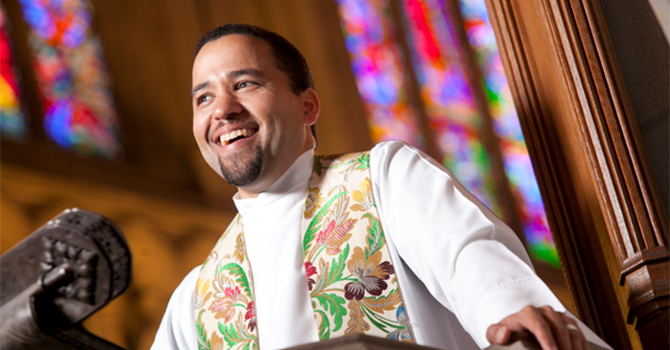Editor’s note: Faith & Leadership offers sermons that shed light on issues of Christian leadership. This sermon was preached on June 2, 2013, at First Presbyterian Church, Spartanburg, S.C.
Psalm 40:1-3, 11-17
2 Corinthians 5:1-7, 14-17
I’m guessing most of you have made mud pies at some point in your life, especially if you grew up in the red-clay hills of the South, where children often make mud pies to pass the time during the long summer days.
Despite the moniker, no one eats them, of course; they’re just for fun.
On a recent mission trip to Haiti, our team saw mud pies, but they were different from ours. Instead of red clay, they were made out of brown dust. Instead of children making them as a pastime, adults made them as a source of both food and a small income.
It broke our hearts the first day we happened upon dozens of mud “cookies,” as they call them, drying out in the sun on an old sheet. For we quickly realized these were not shaped into small round medallions for children to have a pretend picnic or hurl at one another.
Rather, they were going to be sold and eaten, and for some people, these bonbons de terre would be the only source of nourishment they would have.
And we got to view that firsthand the next day. When we arrived at the house to paint that Tuesday morning, an elderly lady with gray hair, who turned out to be the homeowner, was making mud pies. Her age was significant because we saw only a handful of people with gray hair during our week there. Because of the dire circumstances, the average life span for a Haitian is 59.
In the 90-degree heat of the scorching sun, with flies and mosquitoes surrounding her, she would take the dirt, add water, and then run the mixture across a strainer in a trash can-like container in circular motions, over and over. And once she had the proper consistency, she would shape it into small circles and leave them to dry out in the sun. It was as if she were creating something out of nothing.
We saw this concept over and over again in Haiti. With no government trash pickup, the streets and rivers were overflowing with debris. It was everywhere you looked and stepped. And yet Haitians had creative ways of transforming the trash.
These items were more beautiful than the meager dirt cookies. There were earrings and picture frames made out of discarded paper. There was amazing metal artwork fashioned out of old oil drums. With access to only a few scanty resources, Haitians used what little they did have to create something more useful.
Theologically, the idea of new creation is what Paul was trying to portray in this letter to the Corinthians. In fact, many scholars believe that all of Paul’s theological convictions are encapsulated in the final verse of the passage we read this morning: “So if anyone is in Christ, there is a new creation: everything old has passed away; see, everything has become new!” (2 Corinthians 5:17 NRSV).
Here Paul was echoing the early Christians’ idea of imagining salvation as God’s re-creating the world according to the prophet Isaiah’s announcement, “For I am about to create new heavens and a new earth; … be glad and rejoice forever in what I am creating” (Isaiah 65:17-18).
God promises deliverance from exile and renewal in the transformation of the new creation in Christ. It is, in essence, the hope and renewal in our lives because of the saving death and resurrection of Christ for us. It is the possibility of God’s kingdom breaking in at this very moment, of being able to experience the new creation and renewal of God day by day. It is the assurance that our Creator God did not just create for the first six days and then sit back and take a break and drink sweet tea for eternity -- although that does sound pretty nice -- but rather God is always creating anew.
Every day God brings forth new beginnings, new mercies, new life and new love for us. No matter where we find ourselves in life --whether it’s like Paul in the midst of conflict, like the Haitians in the midst of the slums, or just the stress of trying to keep up with the demands of everyday American life -- we can all put our hope in the new creation in Christ. As Paul indicates, our faith in Jesus does not inoculate us against the reality of hardship but rather reframes our life, with Christ at the center.
And therefore many who have every reason for despair nevertheless are lifted toward hope. And as Paul alludes to in this passage, we walk by faith rather than by sight. For in this life we see dimly, but we see enough to believe we have caught a glimpse of the risen Christ, which gives us the courage to walk on in perseverance.
The hardships we experience are never to be discounted or glossed over; life’s suffering is painfully real and difficult. And yet it is amazing and heartening to hear the stories of those who have felt the hope of God’s new creation in the midst of the darkest depths in life.
I recently met a woman whom I deeply respect for what she’s been through. She graciously gave me permission to share her story. From an early age she was abused and violated by family members and others associated with a religious cult. It is hard to fathom the abhorrent things she went through. For years she lived in a dark, desolate pit, like the one mentioned in the psalm this morning. Her soul was dead.
And even in spite of a long-term, loving second marriage, she still felt pretty lost and lonely inside. That is, until one day about a year ago, when her infant grandson touched her right above the heart and “sparked her soul,” as she tells it.
That was the day she began to feel alive again, the day she ever so slowly began to trust once more and have hope in a loving God that died and rose for her. It was when she first began to see and fully experience the power of the new creation and renewal of Christ.
I too remember a dark time in my life, several years ago. My husband and I were living in Durham, and after a long time trying to have a child, we had applied for adoption and matched with a baby. We were elated, and we shared the exciting news with the world that we were going to be parents.
We set up the nursery, and friends had baby showers for us. And then, five weeks before the due date, on a picture-perfect September day on Duke’s beautiful campus, our world came crashing down when we got the phone call that the adoption had fallen through.
The official term for this situation is an “adoption miscarriage,” and that’s what it felt like. We lost a child we had already started loving and bonding with, and in one fell swoop, we lost the dream of being parents to our baby-to-be.
In the days and weeks that followed, we went through all the emotions of the grief cycle, including shock, anger and deep sadness. And yet I will never forget the lovingkindness of my two pastoral colleagues who came over to our house to help pack up the nursery, because it was too much for us to bear to walk by a room that represented shattered dreams.
We cried and prayed as they handed me items like the small baby bath, the soft blanket my best friend had made and the tiny infant clothes, for us to pack away in the attic. And though my sadness did not dissipate, these friends were my first signs of Christ’s hope in the midst of despair.
If you’ve met our 2 1/2-year-old daughter, you know that there is a happy ending to this story. Very soon after the first adoption fell through, we matched with Lettie, who was to be born several months later.
And as we rocked and fed her in the hospital 12 hours after she was born, we experienced God’s new creation in our lives. We saw the love and the light of Christ that could rescue us from such a dark place, wrapped up in an 8-pound, 13-ounce bundle.
It is a fact of life that all of us have experienced or will likely experience trials, tribulations, hurt, loss, grief or suffering. In fact, some of us may be in those places right now.
There are parents still waiting for children. There are victims of abuse still waiting for healing. There are people still eating mud for breakfast.
I like to think of life as a beautiful mess. It’s certainly messy, just like the cross was messy, but it’s also beautiful, like the resurrection. There is loss and there is gain; there is death and there is life; there is suffering and there is hope.
Pastor, professor and author Ronald Byars writes that he is “persuaded that it is at this intersection where despair and hope meet that we come close to the heart of the gospel.”
He goes on to say, “Life itself is cross-shaped. It is a constant conflict between two opposing forces -- what is lost and what is found; the downward pull of [loss and] death, and the upward pull toward life [and wholeness].”
The reason we schlep on with the struggle is because we have been united with Christ, who died and was raised for us. Our hope in the resurrection reminds us that each day is a new creation; every day is a chance of renewal.
And so it is, too, when we take communion. On a night of deep despair, our Lord spoke words of hope. At the table, we remember Christ’s death but feast on the bread of life. It is here that our brokenness meets Christ’s wholeness. The Lord’s Supper is the sign and seal of eating and drinking in communion with the crucified and risen Lord.
As we eat the bread and drink the cup, we remember Christ’s death and resurrection, and we are renewed, empowered and sustained by Christ’s pledge of undying love and continuing presence.
We are sealed in God’s covenant of grace through partaking of Christ’s self-offering. My hope is that when we take communion this morning, as you dip the bread in the cup, that each of you will be reminded of Christ’s promise of renewal in your life.
And as Paul reminds us in his letter to the Corinthians, the new creation is not something we will experience in the distant future, but it is available to us here and now, regardless of our circumstances.
Once our team finished painting her small, concrete house, I stood in front of it with the grandmother who had made the mud cookies. Not able to speak her language, I pointed at the house and gestured with a thumbs-up, silently asking whether she liked the paint job. She looked up at the sky, pointed and said, “Merci, Dieu,” meaning, “Thank you, God.”
Then she turned to me and in English said, “God bless you.” I was touched and humbled by this woman whose faith was so strongly palpable, and who clearly comprehended the new creation and hope, even as she continued to subsist on bonbons de terre.
Like this faithful woman, and as Paul challenges us to do, may we walk by faith and open our eyes to see how Christ has made everything new. Glory be to the Father, Son and Holy Spirit.











